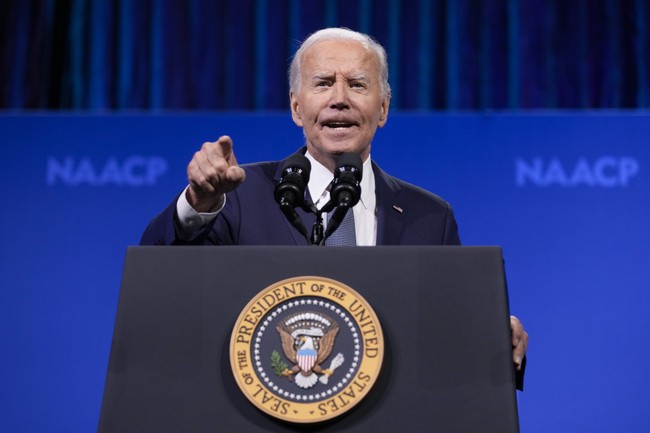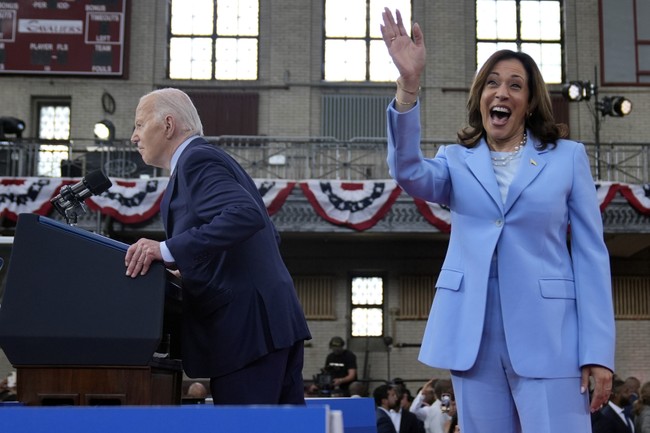Biden Faces Mounting Pressure as Dems Seek Replacement
Mounting pressure from within the Democratic Party signals a critical juncture for President Joe Biden's bid for re-election, as prominent figures call for a change.
Published July 21, 2024 - 00:07am

Image recovered from townhall.com
As President Biden huddles in isolation due to COVID-19, the pressure from within his own party to step down is intensifying. With a flurry of damning leaks and public calls from high-profile Democrats, the president faces a new crisis that threatens to derail his re-election campaign.
Reports indicate that former President Barack Obama is among those urging Biden to reconsider his candidacy, particularly after a disastrous debate performance in late June. According to multiple sources briefed on Obama's thinking, the former president believes that Biden's chances of victory are dwindling rapidly. These concerns are shared by other Democratic leaders, who worry about the party's prospects in the upcoming elections.
Nancy Pelosi, Chuck Schumer, Senate Majority Leader Chuck Schumer, and House Minority Leader Hakeem Jeffries are also reportedly part of an orchestrated campaign pushing Biden to step aside. These leaders argue that Biden's continued candidacy could lead to a catastrophic loss for the Democratic Party, including the potential loss of control over both the Senate and the House.
The friction between Biden and these key figures is unprecedented in recent political history. Biden, who is deeply loyal to the Democratic Party, is said to be fuming over what he sees as betrayal by some of his closest allies, including Pelosi and Obama. This tension is further exacerbated by a series of coordinated leaks to the media, intended to apply pressure on the president to reconsider his bid.
Among the many voices calling for a change, Obama has reportedly expressed a sense of protectiveness towards Biden, seeing his role as that of a mentor and advisor. However, Obama's worries extend beyond personal loyalty; he is deeply concerned about shifting polls that favor Biden's rival, Donald Trump, and the subsequent withdrawal of donor support.
In contrast, there are still some influential Democrats, including former President Bill Clinton and Hillary Clinton, who are privately supportive of Biden's candidacy. Their backing injects complexity into the internal party dynamics, highlighting the divided opinions on Biden's re-election bid.
Biden's campaign has been trying to maintain a semblance of steadiness amidst the chaos. Publicly, his team insists that the president remains committed to running, despite the overwhelming challenges. However, insiders close to Biden note that he is increasingly isolated, seldom consulting with his own pollsters, and citing non-existent favorable polls to reassure himself.
Adding to Biden's difficulties are the escalating leaks designed to break through his bubble of isolation. These leaks reflect the opinion of many Democratic leaders who believe that Biden's re-election bid is not only misguided but potentially disastrous for the party. The leaks are relentless, detailing Biden's declining support, internal polling results, and the general consensus among the party's elite that he must step aside for the good of the party.
Complicating the matter further is the ongoing speculation about who might replace Biden if he steps down. Potential successors fall into two categories: those who fail to connect with blue-collar workers, such as Kamala Harris and Gavin Newsom, and those who have a better rapport with the Midwest electorate but are currently holding critical swing-state governorships, like Gretchen Whitmer and Josh Shapiro.
The Democratic Party's struggle is rooted in a historical context defined by Obama's presidency. During his tenure, the party suffered substantial losses, and efforts to rebuild have been slow. Some analysts argue that Obama's focus on urban progressive policies alienated the blue-collar middle class, a critical voting bloc that continues to shape the party's electoral fortunes.
Obama's influence, both during and after his presidency, has left the Democrats in their current predicament. His endorsement of Hillary Clinton in 2016, despite her disconnect with Rust Belt voters, further illustrates his prioritization of certain constituencies over broader party cohesion.
As the party grapples with the best path forward, the specter of another Trump presidency looms large. The Democrats know that they must present a strong, unified front to counter Trump's growing influence. Yet, the internal divisions and ongoing leaks suggest that achieving unity may be an uphill battle.
In the coming weeks, the Democratic Party will need to make crucial decisions regarding its leadership. Whether Biden persists in his bid or steps aside will have significant ramifications for the party's future. It is clear that the pressure will only intensify, with each passing day bringing new challenges and strategic choices.
Ultimately, the fate of Biden's candidacy will hinge not just on his determination but also on the party's ability to coalesce around a viable alternative. The stakes are extraordinarily high, and the narrative continues to unfold in a manner that will shape American politics for years to come.





